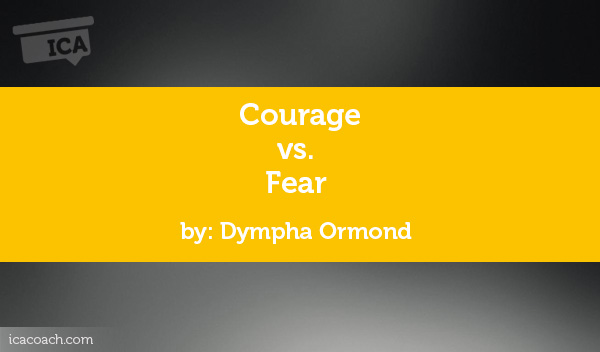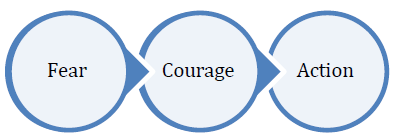
A Coaching Power Tool Created by Dymphna Ormond
(Executive Coach, IRELAND)
The intention is there, however, action doesn’t happen. This can be for our clients and for us as a coach. Something stops our clients taking action; something stops us, the coach, asking those really challenging and thought-provoking questions. In many cases its fear that stops us; the fear of the unknown or something different. The fear looks at the amount of effort required or the discomfort that will be created by following a certain path; the fear brings out the negative self-talk and criticism “what if I fail? What if I am not able? What if I will look silly etc.”. Our self-talk can talk us out of taking that first step, blindly staying on the same path. The fear allows our beliefs (some that we hold onto) to justify not taking action. Even when we believe we are committed to something that fear holds us back. We tell ourselves a story to justify our lack of action. We may also tell ourselves that where we are is ok. The focus is on the fear or the discomfort rather than empowering our thoughts and having the courage to go with the discomfort. We don’t want to explore our inner self and answer challenging questions for fear of what we might learn or have to acknowledge to our-self.
It takes courage to take the first step; it takes courage to go deep into ourselves; it takes courage as a coach to ask our client to explore deeply and/or be open to themselves.
Courage to go with the discomfort is where true learning occurs. The fear keeps us stuck, it inhibits growth and self-awareness is hindered. However, having the courage to take a step into the unknown empowers and energises you.
Courage
Courage is resistance to fear, mastery of fear – not absence of fear. Mark Twain
What is courage?
It is:
Courage is a lot more than just physical bravery. It is also having the mental stamina to take actions that may frighten you; it is taking steps forward even when in pain or experiencing grief.
Courage does not exist without fear. We need to acknowledge the fear and then activate the courage to move forward.

However, we also need passion and a clear commitment to something. Without this, we cannot harness the courage required. Moving on requires the courage of letting go of the familiar. We need the courage to tackle the fears of the future. Self-discovery takes courage.

Have the courage to be imperfect. Brene Brown
Fear
The only thing we have to fear is fear itself. Franklin D Roosevelt.
What is fear?
Fear is:
Fear is the force that keeps us from moving forward; it freezes us or causes us to flee. Fear is the force that focuses on the question “How will I survive this?” It is black or white, them versus us, you versus I.
Fear conjures up negative thoughts about us, the situation, the others; it magnifies the negative; it can create panic when not managed well.
Fear will always be there; it serves a purpose – to protect us. However, the brave or courageous person will acknowledge the fear, assess it in context and summon the courage to take the steps or actions needed.
Common fears include:
What are your fears? If you do not empower your courage to move forward, you will stay behind and the fear will continue to rule you.
The Comfort and Discomfort Zone
The comfort zone is an area of safety and comfort. According to Neil O’Brien (O’Brien, 2012), we have different comfort zones for different areas of our life; some are large and some are small and are relative to our perceived level of competence in that area (our past experience, p ex, and our self-worth, sw) as in the following equation:
P ex + SW = C Z.
The comfort zone, while still challenging, is one where we operate on auto-pilot. It is risk-free. It is the zone of no growth and no change. Outside of the comfort zone is fear, tension, stress, discomfort and also excitement, empowerment and growth. You have choices. Allow this fear and discomfort to have power over you or have the courage to welcome it, embrace it and move forward in spite of it.
Fear keeps you in that dark feeling; courage creates lightness.
What lightness do you want to experience?
How will having courage give you a sense of freedom?
Courage is the willingness to act in spite of your fear. Michael Hyatt
Fear is just a call to exercise courage. Ed Litton
To be brave you need to be scared – they go hand in hand. Give your courage power, the same way you will give fear power. Talk directly to your fear. Communicate the benefits, what’s important, what’s at stake by not taking action, what you will gain by taking action.
What are you feeding – fear or courage? Whichever one you feed will emerge victorious.
Coaching Application
As a coach, we need to be brave and have the courage to move both ourselves and our client into the discomfort zone. Playing it safe will not challenge our client. To grow as a coach we have to be prepared to be uncomfortable and have the courage to face our own fear. If we don’t, we are not with the client and supporting them in the achievement of their goals. We are focused on our needs rather than our client’s needs. Have the courage to lean into the situation and in turn support the client so that they have the courage to lean into their situation. This means we need to have the courage to challenge our client, the courage to create discomfort for them.
As a coach, what is your “why”? What is your passion? What are you committed to? Your passion will help you create your path to becoming a courageous coach. A coach that is willing to and wants to step into their discomfort zone and challenge their client.
Challenging your client (in a safe and supportive way) will support them to be courageous on their journey of self-discovery and creating their future. We all have doubts, we all have fears: the courageous acknowledge and face them. They give themselves permission to not be perfect, to take the first steps and learn from them. To stay within your comfort zone may feel comfortable and safe, initially, however, over time it can tend to shrink you.
Courage takes practice. Practice asking challenging questions of your client that will lead to self-discovery. With practice, your discomfort will shrink and your comfort level will grow. Courage is not giving up at the first sign of difficulty, or a feeling of discomfort or fear. New steps are just that. New. They are steps into the unknown. Take the steps and reflect on what you did, what you achieved and enabled. With courage, choose to use and learn from that new knowledge and experience.
Where are you showing courage as a coach?
How are you showing courage as a coach?
Allow yourself to feel the power of courage. It is exhilarating. Fear is suffocating.
Our client may stay where there they are because they feel that is what they “should” do (according to others). Sometimes the client is fearful of taking the steps out of the fear of what others might think or say or because of other’s expectations that they have for them (or of them). Therefore they are living their lives for someone else. Not for themselves!
Have the courage to support your client to find the answers within them. Acknowledge the courage your clients have shown in coming to you for coaching. It takes courage to show vulnerability and be imperfect (Brown, 2013)
The client’s perception of “what could go wrong” or “could happen” is just that a perception. Support the client to create a new perception. One that empowers, motivates and enables them to make the invisible visible, to explore options and then have the courage to take action.
The brain will search for information to prove itself right e.g. “no good will come of this” or “I am no good at this”. Support your client to uncover new information to demonstrate what is possible despite the fear that they are experiencing; to filter out the negative information and filter in the positive; to learn something new. Perception is just that. A perception, a belief. Sometimes we have a greater need to prove that our perception is right than to succeed. It takes courage to “let go” and see it differently. As a coach, we need the courage to challenge our client here. Moving from fear to courage is difficult. However, once the move is made the next steps are easier. Once the decision has been made to commit to something and you encourage your client to hold themselves accountable to their decision you will have supported them to clear their path.
Reflection
What does courage mean to you?
Where have you demonstrated courage in your life?
What did you or other people do, think or say to help you face your fear?
When did you start to become more at ease or comfortable?
How did you feel afterwards?
Where could you as a coach demonstrate more courage?
What are you most afraid of?
Based on your own reflections, how could you be more courageous?
What barriers stand (mental and physical) in your way? What structures can you create to support you?
(adapted from https://www.psychologytoday.com/intl/blog/the-mindful-self-express/201208/the-six-attributes-courage )
Bibliography
Brown, B. (2013). Daring Greatly: How the courage to be vulnerable transforms the way we live, love, parent and lead. portfolio Penguin.
O’Brien, N. (2012). Time to Fly. Dublin: The Liffey Press Ltd.
Reynolds, M. (n.d.). The Discomfort Zone.